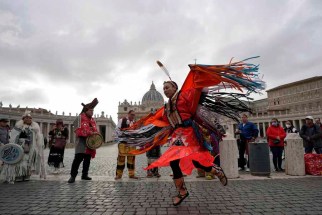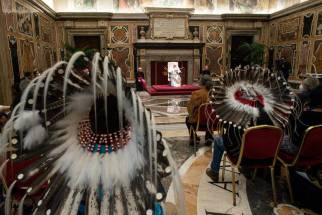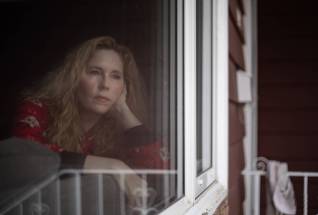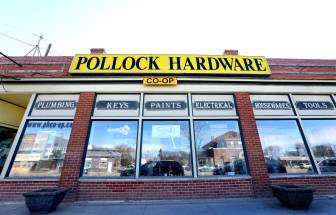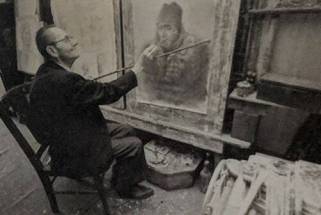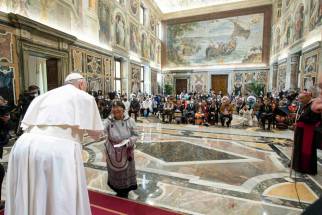‘I am very sorry’ Pope makes historic apology for Catholic Church’s role in residential schools
Read this article for free:
or
Already have an account? Log in here »
To continue reading, please subscribe:
Monthly Digital Subscription
$0 for the first 4 weeks*
- Enjoy unlimited reading on winnipegfreepress.com
- Read the E-Edition, our digital replica newspaper
- Access News Break, our award-winning app
- Play interactive puzzles
*No charge for 4 weeks then price increases to the regular rate of $19.00 plus GST every four weeks. Offer available to new and qualified returning subscribers only. Cancel any time.
Monthly Digital Subscription
$4.75/week*
- Enjoy unlimited reading on winnipegfreepress.com
- Read the E-Edition, our digital replica newspaper
- Access News Break, our award-winning app
- Play interactive puzzles
*Billed as $19 plus GST every four weeks. Cancel any time.
To continue reading, please subscribe:
Add Free Press access to your Brandon Sun subscription for only an additional
$1 for the first 4 weeks*
*Your next subscription payment will increase by $1.00 and you will be charged $16.99 plus GST for four weeks. After four weeks, your payment will increase to $23.99 plus GST every four weeks.
Read unlimited articles for free today:
or
Already have an account? Log in here »
Hey there, time traveller!
This article was published 01/04/2022 (1348 days ago), so information in it may no longer be current.
ROME — “With all my heart, I am very sorry.”
Those eight, simple words spoken by the leader of the Roman Catholic Church Friday delivered a historic and powerful measure of recognition of the pain and suffering generations of First Nations, Métis and Inuit people have endured from being subjected to the cultural, physical and sexual brutalities of Canada’s church-run residential school system.
Papal visit 2022: Full coverage from Rome
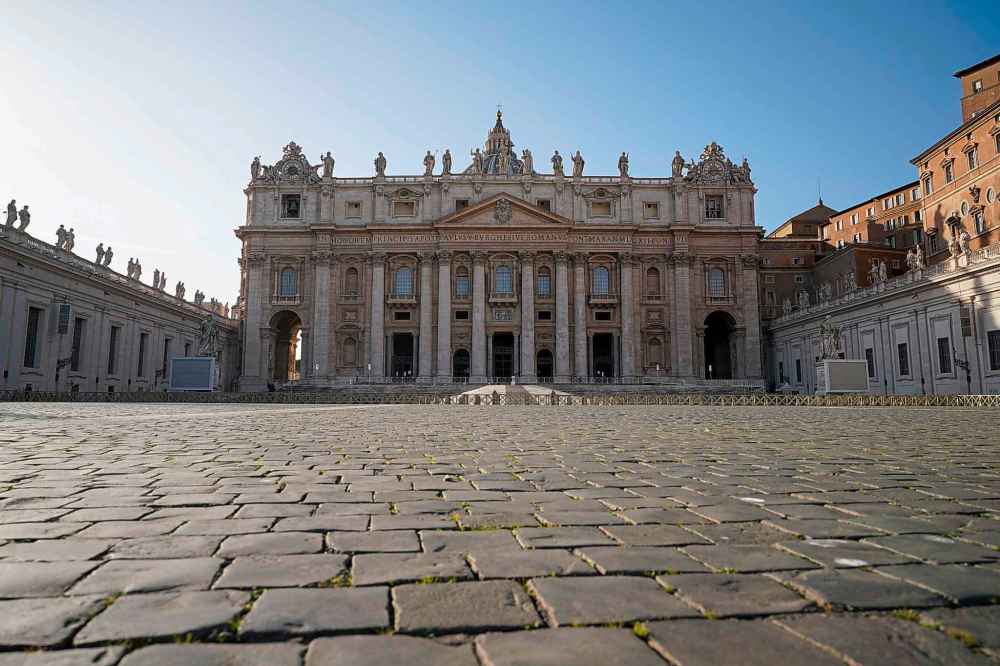
Posted:
Coverage of the visit to the Vatican by First Nations, Métis and Inuit delegates for meetings with Pope Francis.
Pope Francis issued the apology at the end of a week-long series of meetings at the Vatican with 32 Indigenous delegates from Canada that had been contemplated for years and delayed twice because of the pandemic.
Planning took on greater urgency in the past year after the discovery of hundreds of unmarked graves — mostly of children — on or near the sites of residential schools across the country, beginning last spring in Kamloops, B.C.
“For the deplorable conduct of those members of the Catholic Church, I ask forgiveness of the Lord,” Francis said. “And I want to tell you from my heart, that I am greatly pained. And I unite myself with the Canadian bishops in apologizing.”
The pope, who called the survivors’ stories of the identity, culture and spiritual indignities they suffered “chilling,” said he hopes to visit Canada in the summer to apologize in person on Canadian soil.
More than 150,000 Indigenous children in Canada were forced to attend state-funded Christian schools from the 19th century until the 1970s in an effort to isolate them from the influence of their homes and culture. The aim was to Christianize and assimilate them into mainstream society, which previous Canadian governments considered superior.
Ottawa has admitted that physical and sexual abuse was rampant at the schools, with students beaten for speaking their native languages. That legacy of that abuse and isolation from family has been cited by Indigenous leaders as a root cause of the epidemic rates of alcohol and drug addiction in First Nations communities.
After hearing their stories all week, Francis told the Indigenous groups he understood that the colonial project ripped children from their families, cutting off their roots, traditions and culture and provoking intergenerational trauma still being felt today. He said it was a “counter-witness” to the same Gospel that the residential school system purported to uphold.
The long-awaited words marked a major first step on the journey of healing and reconciliation, members of the delegation said later.
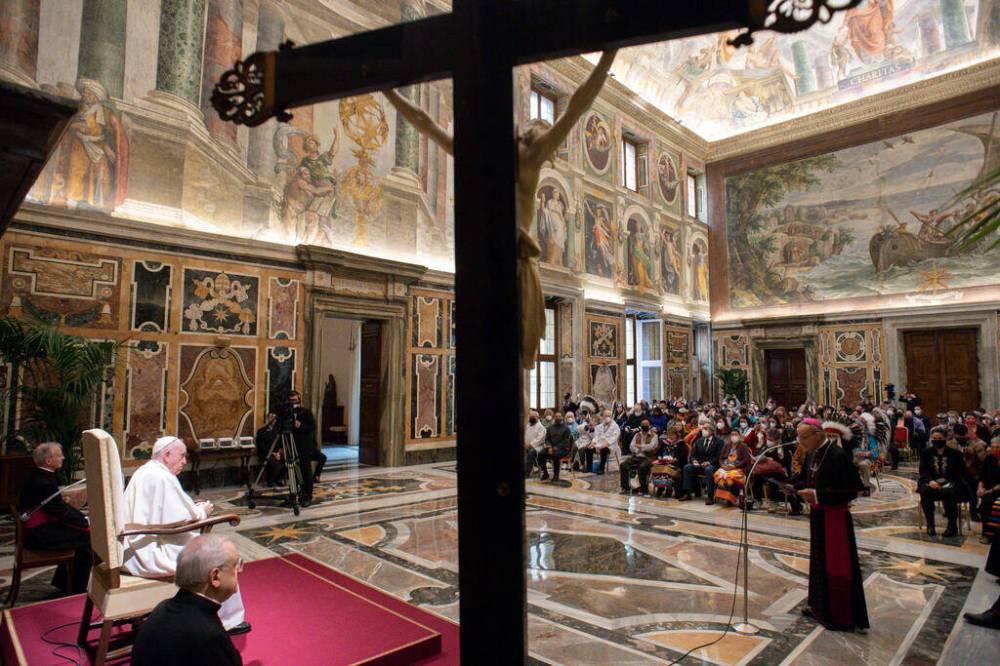
Inuit Tapiriit Kanatami president Natan Obed said there is much work to do, but he was touched by the way the Pope expressed his sorrow.
“The truth of the residential schools, and the harms done, was reflected in the entirety of the Pope’s message,” Obed told a news conference.
Cassidy Caron, president of the Métis National Council, said the meetings were a recognition of her nation as a people.
“We have struggled for recognition, but here we are today, being heard and feeling heard,” she said, adding the pontiff is a man who seeks change.
“I truly felt he translated the truths from his head to his heart.”
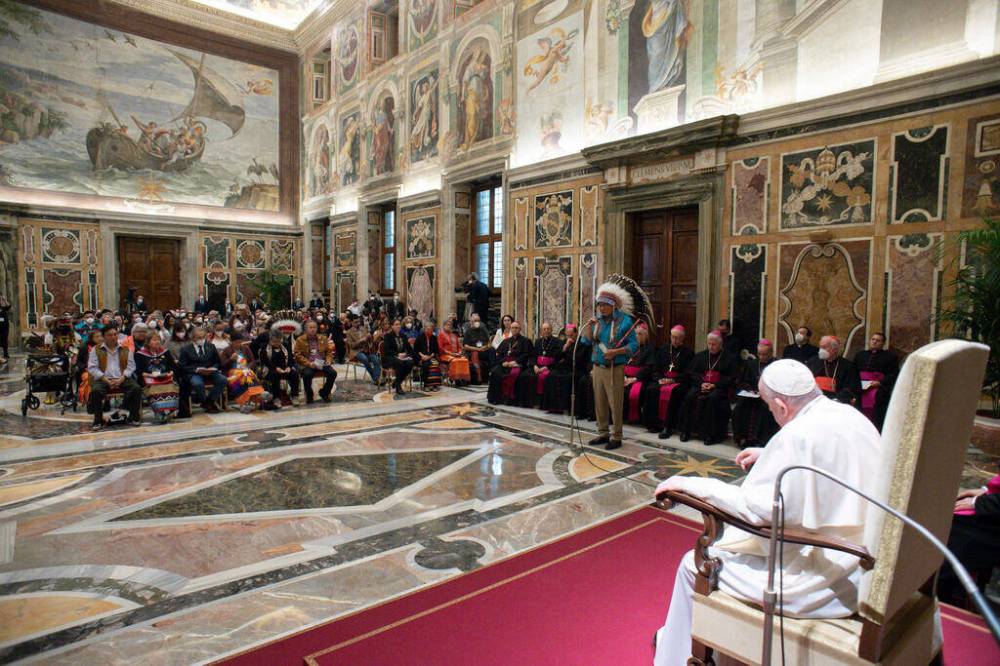
Assembly of First Nations Regional Chief Gerald Antoine said the Pope recognized the cultural genocide that had been inflicted on Indigenous peoples, a “historical first step, however only a first step.”
Antoine compared the week to when hunters see fresh animal prints.
“The hunt is not over,” he said. “We have a ways to go. There’s still lots of work to be done.”
He said he hopes Indigenous people are involved in planning the papal visit to ensure there are stops in locations that hold spiritual significance for Indigenous people.
“I would be disappointed if, after a week like this, we are not included at the decision-making table,” he said.
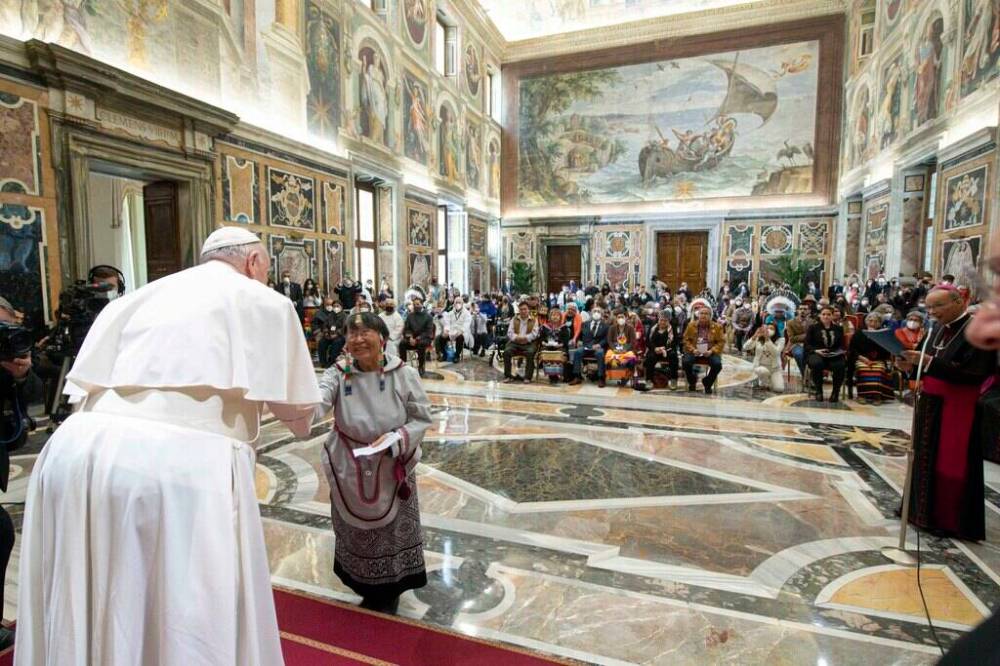
Friday’s meeting began with prayers from each of the First Nations, Métis and Inuit delegations in their own languages, including by elder Fred Kelly, a member of the Anishinaabe Nation in Treaty No. 3, which extends from west of Thunder Bay to just east of Winnipeg.
Along with the prayers, the three delegations presented gifts, including a beaded leather stole made by Therese Dettanikkeaze from Northlands Denesuline Nation in Manitoba, traditional handmade snowshoes, a book of stories from Métis survivors, a cross made of baleen from a bowhead whale and a sealskin pouch.
The Pope offered a bronze olive branch, a symbol of peace and reconciliation, to the three delegations. And he returned a First Nations cradle that the delegation had left with him overnight as he pondered his apology.
It went far beyond what Pope Benedict XVI had offered in 2009 when an Assembly of First Nations delegation visited. At the time, Benedict expressed only his “sorrow at the anguish caused by the deplorable conduct of some members of the church.” But he did not apologize.

The Argentine pope is no stranger to offering apologies for his own errors and for what he himself has termed the “crimes” of the institutional church. Most significantly, during a 2015 visit to Bolivia, he apologized for the sins, crimes and offenses committed by the church against Indigenous peoples during the colonial-era conquest of the Americas.
Bishop Raymond Poisson, president of the Canadian Conference of Catholic Bishops, acknowledged the church’s troubled history in this country.
“(It) is marked with stigma of mistakes and failures to love our neighbour, in particular towards members of those nations who have been present in Canada for centuries,” Poisson said.
Bishop William McGrattan said the church in Canada wants to continue to work towards reconciliation “in a spirit of accompaniment.”
McGrattan said the words from the week’s meetings need to be followed by action at the local level in every part of Canada.
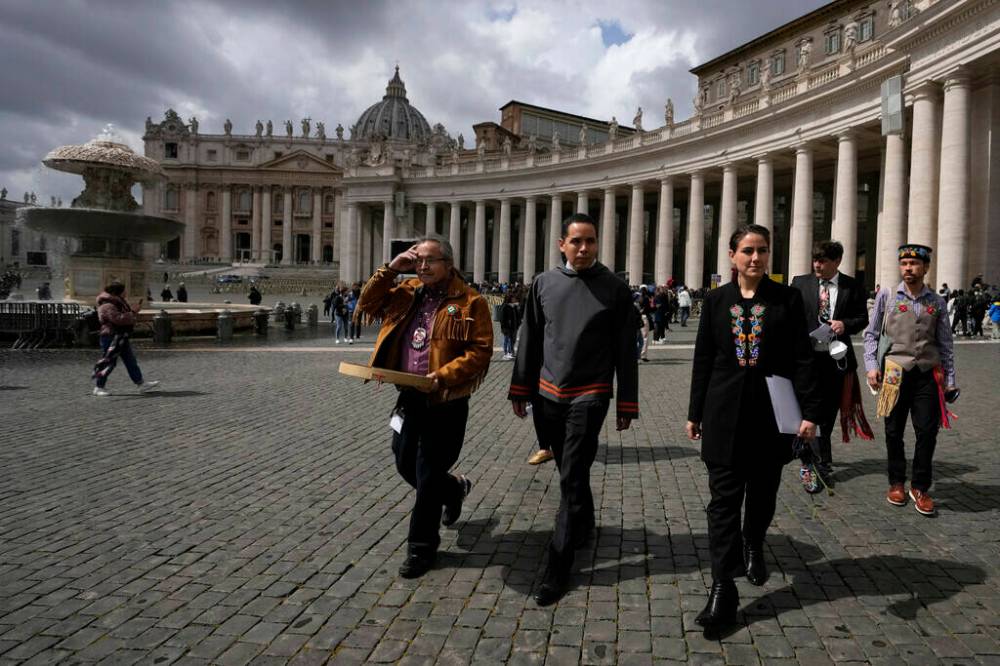
Métis elder Angie Crerar, a residential school survivor from Alberta, was asked to deliver a prayer a the end of the news conference.
“My heart is so full I can hardly speak,” she said, and then related the conversation she had with the Pope earlier.
“’Don’t forget our children.’ He said, ‘I won’t.’
“I could see that in his heart, in his whole body, he loves us and he cares for us,” she said. “When he comes to Canada, we will welcome him.”
— With files from the Associated Press
faith@freepress.mb.ca
John Longhurst is in Rome this week to cover the papal visit by Indigenous people for the Free Press.
The Free Press is committed to covering faith in Manitoba. If you appreciate that coverage, help us do more! Your contribution of $10, $25 or more will allow us to deepen our reporting about faith in the province. Thanks! BECOME A FAITH JOURNALISM SUPPORTER

John Longhurst has been writing for Winnipeg's faith pages since 2003. He also writes for Religion News Service in the U.S., and blogs about the media, marketing and communications at Making the News.
Our newsroom depends on a growing audience of readers to power our journalism. If you are not a paid reader, please consider becoming a subscriber.
Our newsroom depends on its audience of readers to power our journalism. Thank you for your support.
History
Updated on Friday, April 1, 2022 8:48 AM CDT: Adds photo
Updated on Friday, April 1, 2022 11:15 AM CDT: Updated with new information.
Updated on Friday, April 1, 2022 11:40 AM CDT: Corrects typo
Updated on Friday, April 1, 2022 12:55 PM CDT: Adds video
The Free Press acknowledges the financial support it receives from members of the city’s faith community, which makes our coverage of religion possible.



